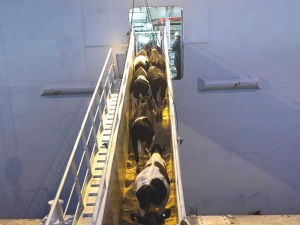Full cabinet
OPINION: Legislation being drafted to bring back the controversial trade of live animal exports by sea is getting stuck in the cogs of Cabinet.
 AGTA chair Mark Willis says the live export industry is disappointed the Government has not offered a probation period to allow it to prove it can adapt to an improved regulatory regime.
AGTA chair Mark Willis says the live export industry is disappointed the Government has not offered a probation period to allow it to prove it can adapt to an improved regulatory regime.
New Zealand's livestock export trade sector is scrambling to fight off government plans to permanently ban the practice.
The sector, which earned the country $255 million in exports in 2020, says it was 'rattled' by the Government announcement in April that it intended to phase out all live exports by 2023. This came on the back of a pause in the trade in September 2020 after the Gulf Livestock 1 ship sank on a journey to China, drowning 41 crew - including two Kiwis and two Australians - and almost 6000 cattle.
When announcing the ban, Agriculture Minister Damien O'Connor cited reputational risk from poor animal welfare practice. He admitted that public pressure had led the Government to end the live export trade by sea.
"We must stay ahead of the curve in a world where animal welfare is under increasing scrutiny," O'Connor claimed when making the announcement.
The live export trade sector was given two years to phase out the livestock exports by sea freight, which will be banned from 2023. However, it says the Government is now trying to pass a bill to amend the Animal Welfare Act, making it harder for any future government to lift the ban.
The Animal Genetics Trade Association (AGTA) represents the interests of the livestock export and germplasm industries. Chair Mark Willis says the decision by Cabinet to ban live exports was against the advice of both the Ministry for Primary Industries (MPI), which had conducted a review of the sector, and the Heron Review into the Gulf Livestock sinking.
"These two significant reviews of the industry found no evidence of animal welfare issues, in fact, to the contrary," he told Rural News. "Animals transported for live export have low mortality, put on weight and go to good homes - and we have proof of that."
Willis says the industry is not against regulation or more oversight of live exports.
"We welcome it. The industry has been calling for this for 15 years or more," he adds. "We want NZ to be a world leader in live exports and offer the gold standard with regards to animal welfare and reputational issues."
In 2020 New Zealand exported $255.89 million of live cattle to the rest of the world. AGTA claims that on top of livestock value that farmers receive directly, a shipment of around 3000 animals can return roughly $1.5 million to New Zealand based service providers.
"It's the rural areas and rural service centres that see most of the economic benefits from the trade," Willis adds. "In the past 10 years, around 5000 farmers have supplied breeding cattle for export, with an average of 40 animals per farm."
He says allegations surrounding animal welfare during the ship voyage were the Government's reason for the ban, even though two independent reviews concluded it should continue, with some modifications.
Willis is disappointed the Government has not offered a probation period to allow the sector to prove it can adapt to an improved regulatory regime. "But we were not offered the opportunity despite many stakeholders crying out for more effective regulation and licensing requirements for several years," he adds.
Willis claims pressure from activists for the ban has sped up progress - despite the sector and MPI working closely on a continuous improvement programme surrounding substantive animal welfare improvements over the years.
"Some of which include management before and during the voyage, with veterinarians onboard every vessel," he explains. "Various requirements have been changed to reduce risks and there are more robust and comprehensive reporting systems and processes throughout."
He says the sector wants to provide assurance of the professionalism and transparency of the export trade.
In the meantime, AGTA has set up a website to help people better understand what livestock exporting is about. Willis is calling on farmers, and others, to directly lobby members of the Primary Select Committee, who he expects to hear submissions on the ban early in the new year.
"The industry has made massive advances in welfare and transparency over the years and should be given the opportunity to prove this."
More at www.livestockexports.nz
New tractor deliveries for 2025 jumped 10% compared to the previous year, a reflection of the positive primary sector outlook, according to the Tractor and Machinery Association (TAMA).
Entries have opened for two awards in the New Zealand Dairy Industry Awards (NZDIA) programme, aimed at helping young farmers progress to farm ownership.
Federated Farmers has confirmed interim chief executive Mike Siermans to the role.
Registrations are now open for the 2026 Ruralco Golf Classic, with all proceeds from the event set to support the Mid Canterbury Rural Support Trust.
Mating wrapped up last month at the across-breed Beef Progeny Test on Pāmu’s Kepler Farm in Manapouri.
Libby Judson is a keeper of memories from an age gone by. Tim Fulton tells her story.